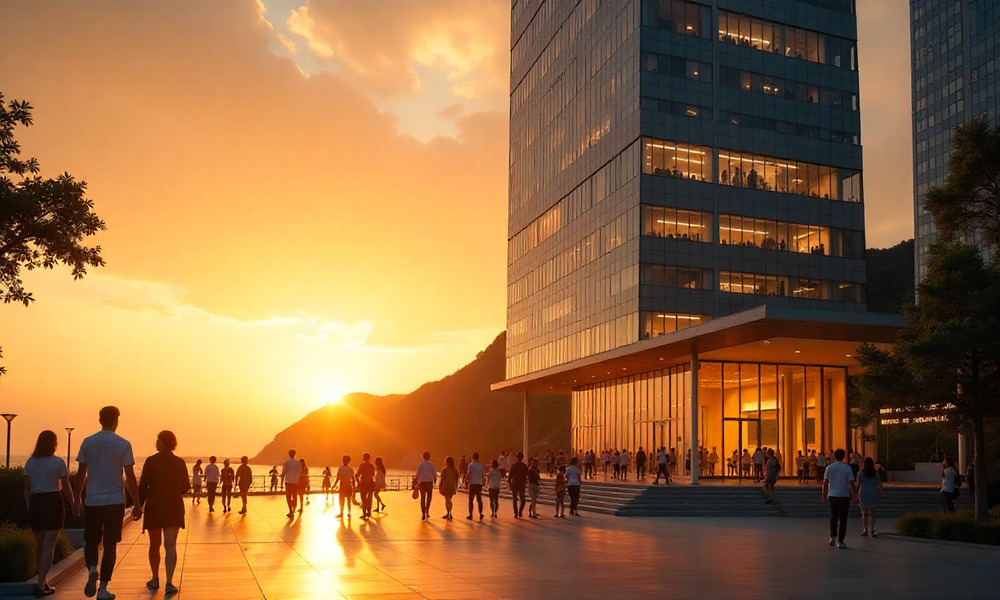Published on
September 2, 2025
Jeju Dream Tower has achieved a remarkable 30.5% revenue increase in August 2025, driven by record-breaking tourist arrivals to South Korea. The surge in visitors, fueled by favorable travel conditions and growing interest from both domestic and international markets, played a key role in boosting the resort’s financial performance. This growth reflects the resort’s strategic positioning in South Korea’s expanding tourism sector, which has seen significant recovery and increased demand in recent months.
Jeju Dream Tower, a leading integrated resort located on Jeju Island, South Korea, has announced an impressive 30.5% revenue growth for August 2025 compared to the previous year.This surge in revenue marks a significant milestone for the resort, which has successfully leveraged the growing demand for leisure and tourism, bolstering its position in the competitive South Korean tourism market.
The resort experienced its highest-ever number of visitors in August, a direct result of favorable travel conditions and heightened interest from both domestic and international tourists. This surge in visitor arrivals played a pivotal role in driving the impressive financial performance of Jeju Dream Tower, highlighting its resilience and adaptability in a dynamic market.
Capitalizing on Unprecedented Demand
As Jeju Island welcomed a record number of tourists in August, Jeju Dream Tower was strategically positioned to take full advantage of this surge. The resort’s diverse offerings, ranging from gaming and entertainment to top-tier hospitality services, allowed it to tap into the spending power of a broad spectrum of visitors. By catering to various aspects of the tourism experience, the resort was able to attract a larger share of the market, resulting in higher overall revenues.
This revenue growth not only reflects a successful month for Jeju Dream Tower but also underscores its strong position within South Korea’s rapidly expanding integrated resort sector. The results demonstrate the effectiveness of the resort’s strategic investments in enhancing customer experience and improving operational efficiency.
Alignment with Broader Tourism Trends
Jeju Dream Tower’s strong results reflect the wider upward momentum in South Korea’s tourism industry. The country has seen a resurgence in domestic and international tourism, fueled by the easing of travel restrictions and an influx of visitors seeking both nature and modern amenities. Jeju Island, with its stunning landscapes and state-of-the-art facilities, has emerged as a prime destination for tourists seeking a blend of relaxation and recreation.
This uptick in tourism activity is part of a wider trend, where South Korea’s tourism industry has been rebounding from previous setbacks. Industry experts view the August performance of Jeju Dream Tower as a clear sign of economic recovery and a growing confidence in the region’s tourism market. The substantial increase in visitor numbers during the peak holiday season provides a strong foundation for sustained growth throughout the year.
Adapting to Changing Visitor Preferences
Looking ahead, Jeju Dream Tower is likely to continue expanding its portfolio of services to meet the evolving needs of its guests. Tourist preferences are changing rapidly, and the resort will need to stay ahead of the curve to maintain its competitive edge. Resorts that can adapt to shifting trends, from entertainment options to more personalized guest services, will be best positioned for continued success.
As competition intensifies in South Korea’s domestic leisure sector, offering a seamless, integrated experience will become increasingly crucial. The unprecedented surge in visitors and the resulting revenue growth underscore Jeju Dream Tower’s strong momentum and rising prominence in the tourism market. The resort’s ability to anticipate and respond to these changes is expected to be key in maintaining its strong market presence.
The Impact of Integrated Resorts on South Korea’s Tourism Landscape
The success of Jeju Dream Tower is also significant for South Korea’s broader vision of integrated resorts as key drivers of economic growth and tourism development. The resort’s performance serves as a model for other destinations looking to capitalize on the rising global demand for leisure and entertainment travel. As South Korea continues to position itself as a top tourism destination, integrated resorts like Jeju Dream Tower will play an essential role in shaping the industry’s future.
A Bright Future
The 30.5% year-on-year revenue growth in August reinforces Jeju Dream Tower’s ability to thrive even amid fluctuating market conditions. It also solidifies Jeju Island’s position as a premier destination for tourists seeking an engaging and diverse holiday experience. With continued investments in guest satisfaction and operational improvements, the resort is well-positioned to maintain its momentum.
As the year progresses, the next few months will be crucial in determining whether Jeju Dream Tower can sustain its current success. Tourism industry stakeholders are closely monitoring how the resort and the island’s tourism sector evolve to meet the changing demands of a more sophisticated and diverse traveler base. Jeju Dream Tower’s continued growth will be a critical indicator of the broader health of South Korea’s tourism industry in the years to come.
